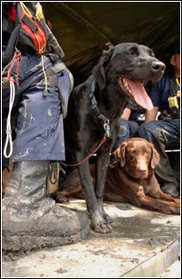 Being a successful search-and-rescue (SAR) dog and handler requires intense training. There are a kennel’s worth of commitments and sacrifices involved, say the experts. The first consideration is the age, breed and temperament of your dog. Because young dogs are easier to train, “you need to start as early as possible during puppyhood,” said Ken Chiacchia, the Pittsburgh, Pa.-based owner of Sophia, a two-year-old female German shepherd, and Pip, an eight-year-old female English shepherd. An older dog can be properly trained if it has already established a good working relationship with its owner. Older dogs trained for police and security work can also be good candidates for search and rescue (SAR) missions, provided they are not aggressive and can be trained not to bite or attack rescue victims on command. A dog of nearly any breed can be trained for specific SAR missions, said Harry Oakes, owner of International K-9 Search and Rescue Services, a training and SAR-for-hire company based in Longview, Wash. Larger dogs such as Labradors, German shepherds and golden retrievers are popular choices for the rugged and demanding nature of many of these jobs, including water, wilderness and avalanche rescues. “But medium-sized dogs like border collies and Australian Kelpies seem to live longer and do well in all aspects of SAR,” Oakes said. “And small dogs are great for disaster work – they can get into tight spaces.” Teaching a young dog old tricksAccording to the Centreville, Va.-based National Association for Search and Rescue, training typically takes a year before a dog and its handler are ready for SAR missions. Some trainers, such as Oakes, are more rigorous in their stipulations. “Our program requires a minimum of four hours of training a week with your dog for 18 months,” he said. To attain “expert” status, that time span stretches to six years. Oakes says dozens of private and public SAR training organizations exist around the country to educate future handlers. Additionally, the Federal Emergency Management Agency offers an urban SAR certification program for dogs and handlers. After the minimum training is completed and you gain certification from that organization or individual trainer, “you have to get certified as a search-and-rescue team member by your county sheriff’s office if you want to get called out on search-and-rescue missions in your county,” Oakes said. “In our area, for example, this is a 40-hour program.” Your homework doesn’t stop there, however. Once trained, “you typically spend 10 hours a week keeping your dog in shape and ready to work at peak performance,” said Michael Lueck, a member of the Search One Rescue Team in Dallas, Texas. “A rescue situation can happen any time, anywhere, so you need to be ready at all times.” Cash commitmentSAR involvement can total up to $4,000 a year or more in out-of-pocket expenses, said Debbie Palman, game warden specialist in Aurora, Maine, who owns an 8-year-old male German shepherd SAR tracking dog named Alex. “I’m lucky, because I get paid to do this professionally, but I also do it on the side as a volunteer,” Palman said. “But most people do it strictly on a volunteer basis.” “There are no municipalities in the United States where there’s enough business to do search and rescues and make a profit,” Chiacchia said. “The only people really making money doing this are being paid by the government as law enforcement personnel, firefighters or rangers.” Making a differenceSo, if there are no greenbacks to be made from becoming a search-and-rescue dog team, why do it? Chiacchia says SAR volunteers do it “out of the kindness of their hearts to make a difference in the lives of others. Let’s face it – there aren’t a whole lot of boy scouts out there.” Most people do it “because they really love spending time with their dogs,” Palman said. “It’s also nice to have a talent or ability that few other people have.” Ultimately, asks Oakes, “What can be more rewarding than the ability to use your dog and your own skills to help save a life or bring closure to a family’s suffering?” Source: webvet A Peaceful Farewell provides compassionate at home pet euthanasia to fellow pet owners in Chandler, Gilbert, Mesa, Tempe, Ahwatukee, Scottsdale, and most of the Greater Phoenix Metropolitan Area.
0 Comments
|
The PAW Blog...
For the LOVE of Pets The goal of this blog is to help educate pet owners by sharing pet health facts and pet news articles...and ... sometimes put a smile on your face with a cute or funny pet story! Categories
All
Archives
July 2024
Search for any topic...
|

 RSS Feed
RSS Feed

